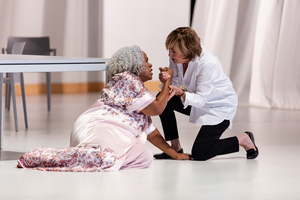Review: SKY ON SWINGS at Home Computer Screens

On May 22, 2020, Opera Philadelphia presented the digital world premiere of composer Lembit Beecher and librettist Hannah Moscovitch's opera Sky on Swings. The company gave the opera's world premiere on Sept. 20, 2018, during its Festival O. Beecher is currently the Saint Paul Chamber Orchestra's composer-in-residence, but he was the inaugural composer-in-residence at Opera Philadelphia. He is also the recipient of a MacDowell Colony Fellowship.
Hannah Moscovitch is considered one of the strongest playwriting voices in Canada. Her work has won multiple awards, most recently the Windham-Campbell Prize for Drama. Earlier, her play, This is War, won the Toronto Critic's Award for Best Canadian Play. At this moment, she is writing a combination of television, opera, theatre, and film projects, including a stage adaptation of the Oprah Winfrey Book Club novel, Fall on Your Knees. She is a Playwright-in-Residence at the Tarragon Theatre in Toronto.
Sky on Swings is the third opera Moscovitch has written with composer Lembit Beecher. Their first collaboration, I Have No Stories to Tell You, premiered with Gotham Chamber Opera in 2014, and was staged in 2017 at the Philadelphia Museum of Art as part of the O17 festival. That same year, Drexel University staged the team's second project, Sophia's Forest.
Sky on Swings tells the stories of two middle aged women, Danny, sung by Frederica von Stade, and Martha, sung by Marietta Simpson. Both their characters suffer from Alzheimer's Disease and the action takes place at an institution that offers "memory care." Martha has been at the institution for some time, but Danny is visiting to see if it is suitable for her. The warmth of Martha's welcome makes her decide to stay. Both characters have moments of lucidity mixed with hallucinations and memories that seemed to replay in their minds.
Using an 11-piece orchestra and some electronically generated sound, Beecher's musical canvas conveyed the short spurts of memory experienced by the victims of Alzheimer's. This composer, however, couched them in unusual instrumental pairings. Fragments of melody were everywhere, but they rarely united. His Greek chorus of Elders sang incomplete sentences in tightly focused harmony because the composer used their sound to describe their unstable world.
Joanna Settle's direction showed that she learned a great deal about Alzheimer's Disease before designing the blocking for this opera. Tilly Grimes' costumes were ordinary street wear and bathrobes. Andres Lieberman's set was a bare institutional "Day Room" with ordinary chairs and a simple table. Pat Collins' lighting and Jorge Cousineau's projections helped to assure the audience that they were in a present day "memory care" ward.
Danny and Martha, the two leading roles, both of which called for mezzo-sopranos, showed the huge range covered by that voice type. At the beginning of the opera Danny sang high above the orchestra, but as time went on her lines received more support from the pit. Danny's high, somewhat irregular lines often contained sharp transitions, while Martha's lower keys and warmer tones reflected the serenity of folk music. Martha looked for her book of matches thinking that she had seen them recently. She looked under the table, as she sang a mini-patter song. Then she crawled under the table and became afraid of something she did not understand as her music changed from calm legato to jagged lines of abject fright.
Danny sang an aria stating "The person I am will go away," as she realized that all her achievements would be lost to her. An institute administrator told her that she had years of meaningful productivity left. Beecher's music told the audience that she was correct in protesting that it wasn't true. She called his statement a crock of S*** and she used the F word, too. Those words are new to opera and some singers enjoy the freedom they invoke.
Danny eventually began to accept her inescapable tragic future and she danced with Martha as each remembered her own past. When Martha's daughter came to take her home for a visit, she agreed to go because Danny told her she will be all right. Martha was aware that she sometimes made scandalous mistakes. She once completely forgot to cloth the lower half of her body before walking down her street. She and Danny had a good laugh over it.
There were some smaller roles in this opera, too, mostly relatives of the institution's residents. Soprano Sharleen Joynt was a lovely young Winnie who sang challenging lines above the staff that contrasted with the music of the two leading ladies. Daniel Taylor was a sensitive Ira and Frank Mitchell a non-committal Administrator. Veronica Chapman-Smith, Maren Montalbano, and George Somerville were the credible chorus of elders.
Geoffrey McDonald is a conductor at the forefront of the American opera scene. Obviously enthusiastic, he gave a well paced, lucid rendition of Beecher's colorful, unique score. His instrumentalists played nimbly in the restless moments and with great sensitivity in the lush, contemplative passages. He is a conductor to watch in the future.
Videos
